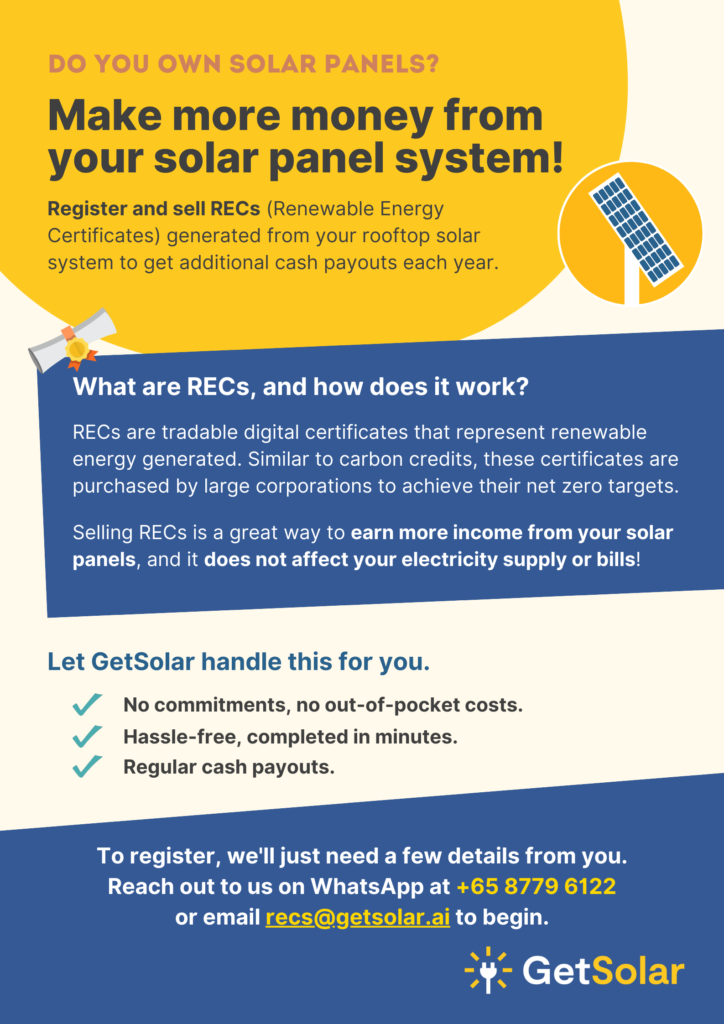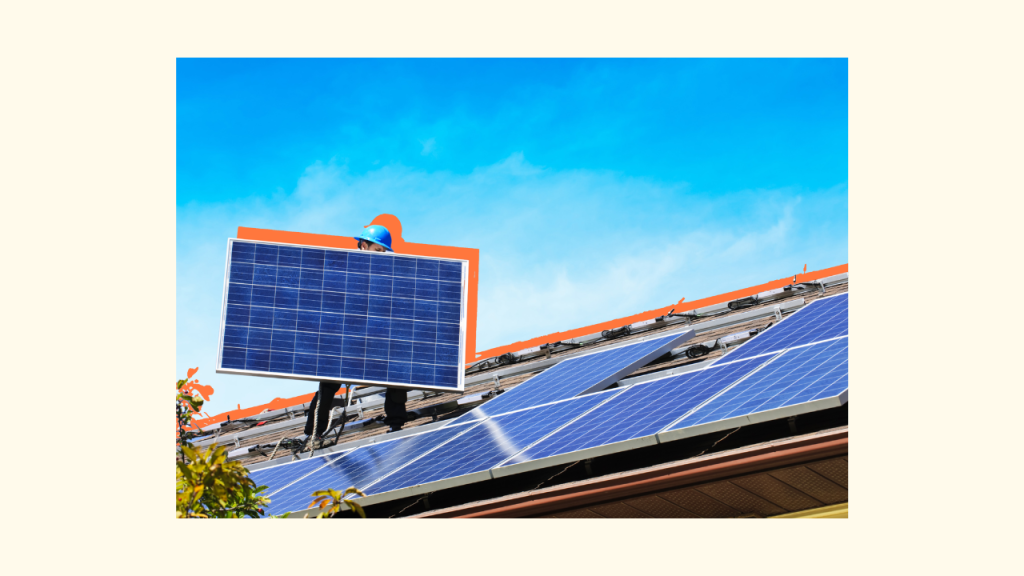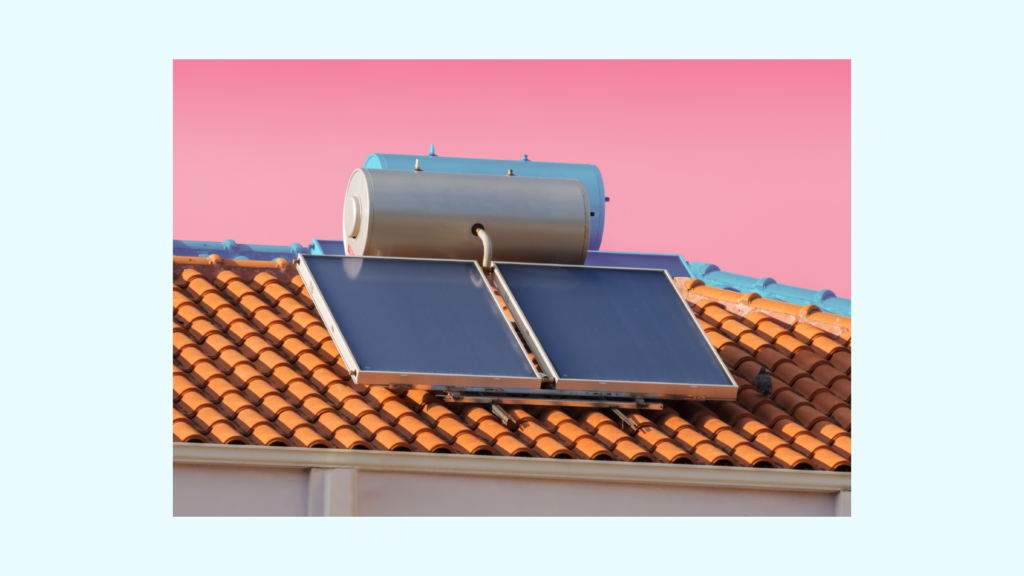Solar is getting increasingly popular in Singapore. Recently, the government even installed one of the largest solar fields in Asia at Tengeh Reservoir! If you’re already in the renewable energy space with your own home solar panel setup, you might be wondering, “what else can I get out of my solar panel system?”. Well… Renewable Energy Certificates (RECs)! Read on to find out what exactly RECs are and why you should get them in Singapore.
Renewable Energy Certificates (RECs): The Basics
Let’s begin with an explanation of what Renewable Energy Certificates or RECs are.
To put it short and simple, RECs are tradable assets that quantify the energy generated by renewable energy sources like solar panels and wind turbines. Think of it like credits that your solar panel setup can continually generate to be sold for a profit. This might still sound very vague and unclear, fret not, we’ll explain further!
Acquiring or selling RECs is not the same as buying or selling green electricity. Instead, RECs merely represent the clean energy attributes of the electricity generated from a renewable energy source. This is a similar concept to carbon credits, which can also be traded. This means that to sell RECs, you’ll first need to own a renewable energy generation source — in Singapore, this will typically be a solar panel system.
Conventionally, one REC is produced when a renewable energy source generates 1 megawatt-hour (MWh) of electricity. This means that you’ll be able to register 1 REC per 1 MWh of clean energy that your solar PV system generates. The REC then helps to certify that you’re the owner of the clean energy attribute and your solar panel setup successfully generated 1MWh of clean electricity within a specific year (also termed a “vintage”, similar to wine).
Start Selling Your RECs Today!
Why do people or companies buy or sell RECs?

RECs are usually bought up by companies with sustainability or net zero targets, specific to their energy consumption. In different countries, the share of non-renewable (or fossil fuel based energy sources) in the electricity grid will be different. In Singapore as an example, given that 95% of Singapore’s electricity mix comes from natural gas, a non-renewable energy source, in order to meet net zero targets, companies will need to purchase the equivalent amount of RECs (in megawatt-hours) to offset their electricity consumption from the electrical grid.
Companies typically purchase RECs due to a limited ability (or roof space) for them to be able to generate their own clean energy for their use. When a company purchases RECs, in essence, the company is paying for the clean energy electrons injected into the same electrical grid from other solar panels in the same country, for their own use.
Of course, the same principles for carbon offsets apply – with RECs needing to be verifiable, quantifiable, not double-counted and not claimed by another entity. Companies who wish to use RECs to meet their sustainability targets will need to retire or cancel the RECs in their name after purchase, so that these RECs are no longer tradable.
With many countries around the world — including Singapore — introducing stricter regulations on carbon emissions, more companies will need to ensure that they are meeting sustainability regulations. Overall, this is great for REC sellers like yourself: more demand means more profit!
How much are RECs worth?
The price of RECs fluctuates based on demand and supply. That said, as of mid-2023, selling 1 REC in Singapore for small or medium asset owners will fetch between SGD 20 to 35.
However it’s important to also note that the tradable RECs market is still very much in its infancy and is rapidly evolving. Changes in regulations or demand and supply can swing prices in both directions, and unfortunately transactions and prices are often not fully transparent with most trades being done over-the-counter (OTC).
If you’ve made the right calculations, getting RECs can be one of the top solar financial benefits in Singapore! What’s more, you’ll still be able to enjoy your usual monthly utility bill savings from your solar setup.
Selling RECs in Singapore
Here comes the challenging part: acquiring and selling RECs in Singapore. Trading RECs in Singapore is a tiresome and hands-on process with many hidden costs. In our step-by-step guide to selling RECs in Singapore, we run through all the important points that you need to take note of at each juncture of the REC sales process.

Do you have a solar panel setup and want to acquire and sell RECs? Don’t have the time to do so on your own or sell enough RECs to cover all the registration and transaction costs? Let GetSolar sell your RECs for you.
We simplify the long and tedious REC sales process into 1 simple step. All you’ll need to do is provide us with authorisation to sell your RECs on your behalf and you’ll be able to sit back and enjoy consistent cash payouts from your REC sales!
This article was first published on 30 October 2021 and last updated on 24 April 2024.
Get an Instant Solar Estimate for your Property Now!
Whether you’re ready to install solar panels on your rooftop, or just wondering how you can benefit from solar, use our instant solar assessment tool to get an estimate of the solar potential of your property and find out how much you can save. At GetSolar, we combine geospatial analysis of satellite imagery with big data and artificial intelligence to provide you with reliable and accurate solar information so that you can make a better solar choice!




